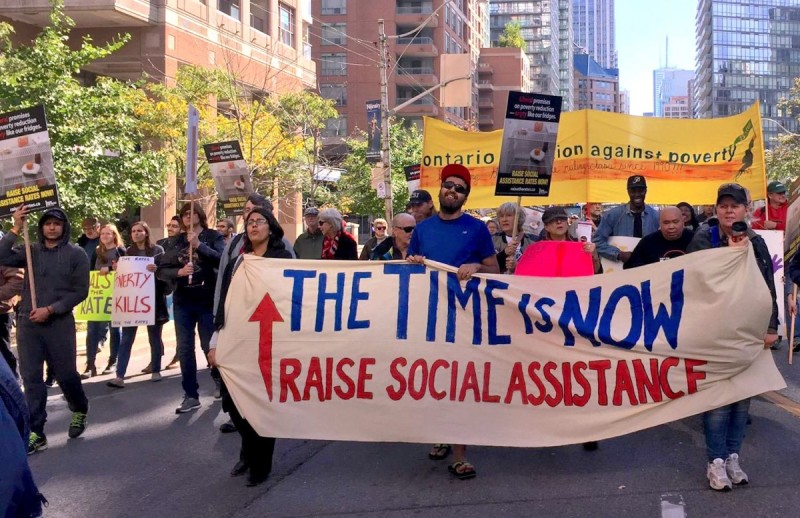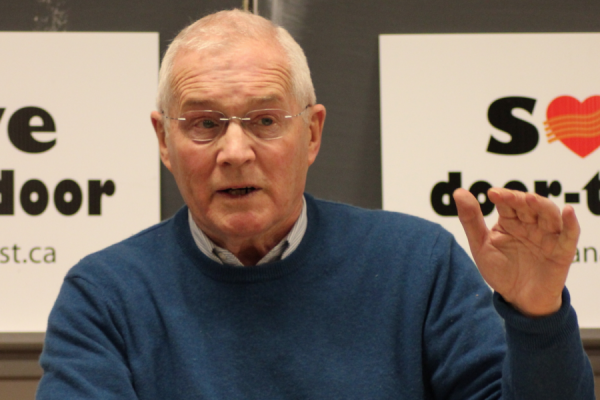Closing with care
For more than 30 years, OCAP was a lodestar on the radical left. Bringing it to a close is a difficult but honourable decision

Ontario Coalition Against Poverty (OCAP) rally in downtown Toronto. Photo courtesy Global Labour Research Centre/York University.
The Ontario Coalition Against Poverty (OCAP) has announced its formal end. On May 13, 2023, OCAP’s Annual General Meeting formally voted to retire the organization and put its remaining resources toward anti-poverty struggles in Toronto.
For more than 30 years, OCAP was a lodestar on the radical left, propelling an anti-capitalism rooted in the struggles of poor people and a resolute commitment to mass organizing and confrontational direct action. Like many other activists who came of age politically during those years, I was inspired by OCAP and involved in groups that tried to emulate it. I continue to believe that there is a tremendous amount that we can learn from this organization, including both its strengths and limitations. I’m grateful to the knowledgeable organizers who have already worked to distill some of these lessons, and I’m hoping more will do so.
Here, I want to lift up one key lesson that we can take from OCAP: intentional endings are important. I know very little about the deliberations that went into the decision by OCAP members to retire their organization. But I have deep respect for groups of people that do the difficult, unglamorous work of reflecting on their efforts, determining that their organization is no longer viable, and purposefully bringing it to a close.
Of the dozens of groups and campaigns with which I’ve been involved, I can count on one hand the number that made a deliberate, collective decision to stop. Sadly, this is not at all uncommon on the left. Most often, initiatives fade away through attrition driven by some combination of disillusionment, partial victories, exhaustion, mounting tensions, and new challenges that feel insurmountable. In some cases, groups carry on as mostly hollowed-out shells with only a handful of people still involved and not much more than an online presence. Intentional conclusions are rare.
What accounts for this? I suspect that, at least in part, it has something to do with a dominant culture that glamorizes new endeavors and evades loss and grief. I’m pretty certain, as well, that our underdeveloped capacities for working with conflict play a significant role: unaddressed internal tensions frequently contribute to organizational decline, and in turn, declining organizations are more susceptible to seemingly intractable conflicts. I think there is also perhaps a sense on the left that the only way to win is if our initiatives continue forever. Ending something, for many of us, can feel like a failure.
But concluding our activities with care ultimately strengthens movements. Formal endings enable people to mark and experience loss together, making space for individual and collective grief. This kind of grieving process is essential not just for our wellbeing, but also for allowing us to make commitments to new political initiatives. Conscious conclusions also open opportunities for us to reflect on our shared experiences, both good and bad, and draw out useable knowledge for future efforts. In addition, deliberate wind-ups allow groups to take care of crucial logistical details and obligations, such as wrapping up campaigns, shutting down finances, alerting organizational allies, and archiving websites.
None of this is fantasy. Along with OCAP, there are other organizations that have purposefully ended. One example that has long inspired me is Movement for a New Society (MNS), a US-based network of collectives active in direct-action movements of the 1970s and 1980s. As Andy Cornell details in his excellent book Oppose and Propose!, MNS came into major organizational and strategic questions after more than a decade of work. After many unsuccessful attempts to resolve these questions, assembled members of the network decided in 1988 to “lay the group down,” a procedure drawn from the Quaker tradition. “Doing so, the members agreed, would allow them to devote their energy to new efforts able to more effectively meet the political challenges of the 1990s,” recounts Cornell.
A more recent example from where I live is the Ottawa Street Medics (OSM), a collective that was active in Ottawa between 2020-2021. OSM coordinated mutual aid efforts, including significant fundraising and resource redistribution, and regularly provided first aid at protests, especially during street mobilizations following the police murder of George Floyd. Facing mounting internal challenges in late 2021, OSM paused its work and then compiled a collective assessment. An instructive model for concluding a group, this assessment includes detailed accounting of how they raised and disbursed donations, a description of how they operated, and frank reflections on the difficulties they experienced.
We can learn from the sense of responsibility that these groups—and others like them—have brought to their endings. We can also consciously build the skills and habits of closing into the daily activities of political organizing. After all, we all need practice ending things well. If we don’t start working on closings until we’re in an intense situation of laying down a whole organization, we likely won’t feel very well-equipped to respond responsibly to that high-stakes circumstance.
Two lower-stakes closing practices that have been particularly useful in my experience are concluding every meeting with a go-around to “check out” and taking time for an intentional evaluation following group activities. Gatherings, marches, trainings, direct actions, outreach sessions, pickets, public events—all of these are stronger when we end them deliberately and collectively. And in so doing, we build greater capacities for finishing things with intention.
Closing, in short, can be a way that we care.
Chris Dixon is a long-time activist, writer, and educator. Originally from Alaska, he lives in Ottawa on unceded Algonquin territory, where he is a member of the Punch Up Collective. Find him online at writingwithmovements.com.










